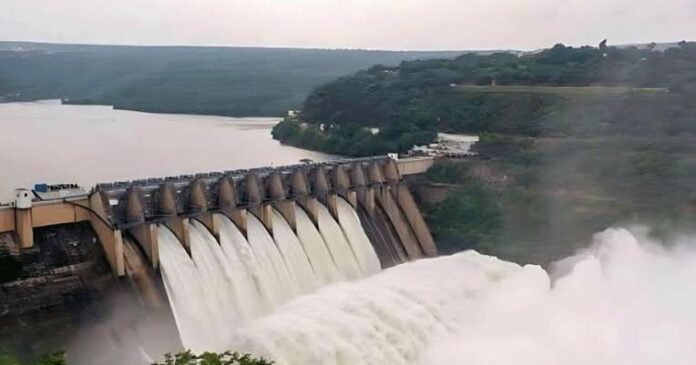The Nigeria Hydrological Services Agency, NIHSA, said yesterday that water from the Lagdo Dam in Cameroon has been released into Rivers Niger and Benue.
Consequently, the agency warned Nigerian residents in floodplains to relocate immediately to safe spaces in anticipation of attendant floods that annually come with the release of water from the dam.
The release of water from Lagdo Dam comes days after water from overflowing Alau Dam killed over 30 persons and swept away thousands of homes in Maiduguri, the Borno State capital, last weekend.
NIHSA Director-General, Umar Mohammed, who gave the warning when he was featured on Channels Television’s The Morning Brief breakfast programme monitored by the Trumpet Newspaper correspondent, said his agency met with the authorities in Cameroon and agreed that water from the dam be released “intermittently” for the River Benue and River Niger in Nigeria to be able to contain the volume of water to avoid flooding in 11 states at risk.
Read also: Borno Police command urges caution in post-flood disaster management
“The situation is that water from Cameroon’s Lagdo Dam has been released already since Wednesday, and there is an agreement that the water should be released in phases,” said Mohammed, who was represented on the programme by the Agency’s Director of Operations and Hydrology, Femi Bejide.
Recall that on Tuesday, the federal government alerted Nigerians to the plan by the Cameroonian authorities to release water from the Lagdo Dam.
NIHSA listed flood-prone states to include Adamawa, Taraba, Benue, Nasarawa, Kogi, Edo, Delta, Anambra, Bayelsa, Cross Rivers, and Rivers respectively.
The NIHSA boss said for now, there was calm and normalcy, adding that the water was being regularised from the Lagdo dam, though with rising currents.
He said all Nigerians had a role to play in preventing flooding, as the previous release of water from the Lagdo Dam has caused constant flooding in Nigeria.
The NIHSA boss said: “Everybody has their part to play; as the federal government is doing its part, our agency is doing its part, NEMA is prepared, individuals should also have to do their part. They have to move from the floodplain.
“Houses also have their drainages; they have to clean and clear their drainages. Water will find its way, so the waterways should be cleared, the drainages should be cleared to allow water to move. That is the responsibility of everybody. Look at your house, if your house is at the flood plain, please move, it is an appeal.”
Mohammed said a report had been submitted to the Presidency on the way forward, noting that some of dams in Nigeria should be de-silted.






